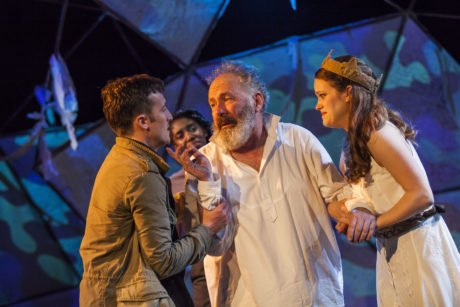King Lear has sometimes been called the Everest of classical acting. Every great Shakespearean actor must sooner or later face the physically and emotionally exhausting task of playing the part. Some simply give up. Albert Finney, when asked, is reported to have said; “Oh God, eight shows a week doing Lear – no, no, no.” Derek Jacobi, whose Lear was widely praised, called it the “Lear hoop” which one must jump through. The role of Lear is notoriously hard on actors. Jonathan Pryce put his back out carrying Cordelia. Edward Petherbridge had a stroke after two days of rehearsals. One famous Lear, Donald Wolfit, is said to have given the following advice on the role: “Get a light Cordelia and keep an eye on the Fool.”

Shakespeare scholar Jonathan Bate believes that for a successful Lear you need a minimal set, closeness to the audience, and a Lear who is the right age. In an article in The Telegraph, he continues: “The key to a great production is the ability to hold together the huge and the tiny, the universal and the local, the epic and the intimate. Shakespeare’s language makes just this demand, as it moves at speed from vast philosophical questions (“Is there any cause in nature that makes these hard hearts?”) to the language of small and ordinary things — garden waterpots, gilded flies and toasted cheese… It’s sometimes said that the problem with the part of Lear is that “by the time you are old enough to play it, you are too old to play it.”
Avant Bard’s production of King Lear meets all these preconditions. The set is minimal, and the staging is in the round; a wonderfully intimate venue. Even better, Foucheux is not only the perfect age (60s) but perfect for the part.
His Lear is a triumph. One of the glories of the performance is his voice. Voice, voice, voice. What Lear can succeed without it? Foucheux has an instinctive command of voice, from the loudest scream to the softest whisper. His physicality is equally masterful. He inhabits his body like a lion at bay, and rages at the gods like a wounded beast. One of the most memorable scenes is Lear, standing on the central platform, shouting imprecations at the sky, while the storm’s wrath swirls around him.
His relationship with Gloucester (Cam Magee) is a high point of the production. The play is well known for its double plot; Lear rejects Cordelia, the one daughter who truly loves him, in favor of the duplicitous Goneril and Regan. Gloucester believes the lies of her ice-cold illegitimate son, Edmund, and casts off Edgar, the good son who struggles and survives. The harrowing aspects of the drama are intensified by having Gloucester played as a woman. Magee’s magnificent performance enlarges the possibilities of the character and her story. The look she exchanges with Lear in the beginning is deeply knowing. They seem to share a mature love. Magee’s connection to sons Edgar and Edmund introduces the subject of maternal love and suffering. Instead of a play focusing solely on the ultimate father figure, we see the actions of the mother as a key element of the plot. This is a marvelous innovation and a heartening turn of events for those of us who love Shakespeare and lament the paucity of women’s parts.

Magee’s early lines as Gloucester, in the hands of a male actor, would come across as somewhat coarse boasting.
“[T]hough this knave came something saucily into the
world before he was sent for, yet was his mother
fair; there was good sport at his making, and the
whoreson must be acknowledged.”
—King Lear, Act I, Scene 1.
In Magee’s hands, Gloucester is a player, a confident, powerful woman who acknowledges her son’s illegitimacy as blandly as she would his rejection by the college of his choice.
Lear begins as an arrogant despot. His lack of self-knowledge makes him easy prey for the manipulations of Goneril (Alyssa Sanders) and Regan (Charlene V. Smith). Sanders plays Goneril, the dominant sister, as a mix of aggression and underlying sensuality. As Regan, Charlene V. Smith has a magnetic presence and an innate ferocity. The two sisters’ deceitfulness seems inborn, but there is no doubt that greed and intense jealousy of Cordelia (Kathryn Zoerb) play a role in their machinations.
Lear’s overwhelming need for Cordelia’s love seems to provoke her refusal to flatter him. Foucheux and Zoerb establish a strong bond which causes excruciating pain when it is broken. They seem alike, as well—resolute and stubborn. Their reconciliation mirrors their emotional growth. Lear, who has lost everything, has gained his humanity. Cordelia has rediscovered her love for her father, and her ability to comfort him.
Christopher Henley’s Fool is full of sound, fury, and impudent wisdom. Henley creates a complex Fool who is not afraid to challenge his master. “Dost thou call me fool, boy?” Lear asks. “All thy other titles thou hast given away,” the Fool replies. “That thou wast born with.”
Dylan Morrison Myers’ Edmund is constantly on the move, plotting, romancing Goneril and Regan, achieving his objectives with ruthless efficiency. The character, akin to Iago, is intellectually driven and completely devoid of empathy. Myers is extremely effective in the role.
Edgar (Sara Barker), on the run from his brother’s baseless accusations, becomes “Poor Tom,” a shambling, demon-ridden fugitive. Barker is exceptional in both roles, as the honest Edgar, who believes his malevolent brother without question, and as the haunted Tom, a terrible denial of identity which almost costs him his life. The casting of a female as Edgar emphasizes the modern notion of gender as a performance.
Frank Britton’s Cornwall, resplendent in a red jacket, is as mercurial and bellicose as it is possible to be. With the more morally aware but ineffective Albany (Christian R. Gibbs), he plans and schemes to find his way through the morass of the disintegrating kingdom. Britton, a formidable presence, has a physicality that works beautifully for the part. Gibbs’ understated sincerity is well-suited to his role as one of the few sympathetic characters.
Because Gloucester is played by a woman, Kent’s role as Lear’s male friend and defender becomes even more crucial. Vince Eisenson is by turns fiercely indignant, philosophical, and always provocative. Louis E. Davis finds some unusual shadings in the role of Oswald, and as Burgundy, he rejects the penniless Cordelia with brisk practicality.
The Ensemble: Tiffany Byrd (Doctor/Knight/Attendant/Messenger) and Greg Watkins (First Servant/Knight/Attendant/Messenger) perform a dizzying variety of roles with enormous commitment.

The creative team, Director Tom Prewitt, Scenic Designer Jonathan Dahm Robertson, Lighting Designer John D. Alexander, and Sound Designer and Composer Justin Schmitz have worked wonders in this small space. There is lightning which seems to break over the audience, evocative music at just the right time, and a set which suggests the environment without being distracting. The costume design by Elizabeth Ennis is eclectic. Goneril and Regan, fittingly in red and black, make a lovely pair of harpies. Cordelia is in white, another traditional choice. The men’s costumes have a largely military aspect. Fight Choreographer Casey Kaleba builds in combat which is enlivening and believable.
This King Lear has the core of elemental truth which is so hard to describe and so difficult to attain. The great lines come at us in a new way, as part of a brutal world which is paradoxically filled with kindness and acts of love. It is the perfect antidote to 24-7 media, which seems to turn everything into a tweet or a car commercial. The pain here is close to the surface, and real.
Director Tom Prewitt and his cast have crafted a Lear who would be at home in today’s headlines. Covfefe.
Running Time: Two hours and 45 minutes, with one intermission.
King Lear plays through June 25, 2017, at Avant Bard performing at Gunston Arts Center, Theatre Two – 2700 South Lang Street, in Arlington, VA. For tickets, call the box office at (703) 418-4808, or purchase them online.






This is a wonderfully erudite review. It belongs in a permanent collection. Maybe someone will publish an anthology of “The Best of DC MTA”!